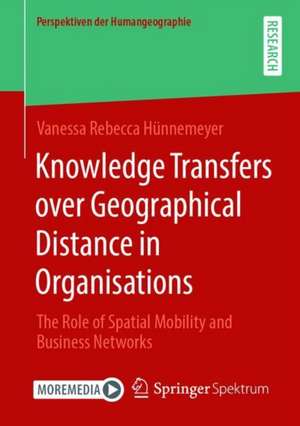Knowledge Transfers over Geographical Distance in Organisations: The Role of Spatial Mobility and Business Networks: Perspektiven der Humangeographie
Autor Vanessa Rebecca Hünnemeyeren Limba Engleză Paperback – 31 aug 2020
The study examines in which ways spatially mobile employees, i.e. expatriates, contribute to those knowledge flows. The study of ego networks reveals not only social dynamics of knowledge transfer, but the geographical framework allows to discuss knowledge flows from a spatial perspective. On the one hand, the empirical results confirm their knowledge transfer function. On the other hand, the relational geographical perspective reveals that expatriates do not represent a homogeneous group, but their roles in the knowledge transfer process, the geographical reach of their networks and their knowledge resources depend on job-, knowledge-, individual- and space-related factors.
Preț: 387.38 lei
Nou
Puncte Express: 581
Preț estimativ în valută:
74.14€ • 76.41$ • 62.60£
74.14€ • 76.41$ • 62.60£
Carte tipărită la comandă
Livrare economică 03-17 martie
Preluare comenzi: 021 569.72.76
Specificații
ISBN-13: 9783658310172
ISBN-10: 3658310170
Pagini: 302
Ilustrații: XXX, 302 p. 72 illus., 10 illus. in color.
Dimensiuni: 148 x 210 mm
Greutate: 0.4 kg
Ediția:1st ed. 2020
Editura: Springer Fachmedien Wiesbaden
Colecția Springer Spektrum
Seria Perspektiven der Humangeographie
Locul publicării:Wiesbaden, Germany
ISBN-10: 3658310170
Pagini: 302
Ilustrații: XXX, 302 p. 72 illus., 10 illus. in color.
Dimensiuni: 148 x 210 mm
Greutate: 0.4 kg
Ediția:1st ed. 2020
Editura: Springer Fachmedien Wiesbaden
Colecția Springer Spektrum
Seria Perspektiven der Humangeographie
Locul publicării:Wiesbaden, Germany
Cuprins
Introduction.- Knowledge transfer, space and organisations: a multi-perspective discussion.- Being mobile at work: mobility practices in organisations and their impact on intra-firm networks and knowledge transfers.- Expatriation: social networks and knowledge flows.- Situating the research question.- Studying social networks and knowledge transfer over geographical distance in organisations.- The business perspective: the role of spatial mobility and intra-firm social ties.- The expatriate perspective: spatial mobility, social networks and flows of knowledge.- Discussion of empirical finding.- Final conclusion.
Notă biografică
Graduating with a B.Sc. in Applied Geography and M.A. in Urban Studies, Vanessa Hünnemeyer completed her PhD in Economic Geography at the Friedrich Schiller University Jena. Today, she consults federal, state, and municipal governments on issues of regional development.
Textul de pe ultima copertă
Current corporate structures based on internationalisation and decentralisation are opposed to the nature of the most important resource: knowledge. The acquisition and exchange of (tacit) knowledge relies on interpersonal interactions and is thus time- and place-dependent. Given that the combination of heterogeneous knowledge stocks furthers innovation, organisations develop strategies to ensure the transfer of knowledge. To enable intra-organisational knowledge flows spatial mobility at the workplace affects a wide range of employees.
The study examines in which ways spatially mobile employees, i.e. expatriates, contribute to those knowledge flows. The study of ego networks reveals not only social dynamics of knowledge transfer, but the geographical framework allows to discuss knowledge flows from a spatial perspective. On the one hand, the empirical results confirm their knowledge transfer function. On the other hand, the relational geographical perspective reveals that expatriates do not represent a homogeneous group, but their roles in the knowledge transfer process, the geographical reach of their networks and their knowledge resources depend on job-, knowledge-, individual- and space-related factors.
The study examines in which ways spatially mobile employees, i.e. expatriates, contribute to those knowledge flows. The study of ego networks reveals not only social dynamics of knowledge transfer, but the geographical framework allows to discuss knowledge flows from a spatial perspective. On the one hand, the empirical results confirm their knowledge transfer function. On the other hand, the relational geographical perspective reveals that expatriates do not represent a homogeneous group, but their roles in the knowledge transfer process, the geographical reach of their networks and their knowledge resources depend on job-, knowledge-, individual- and space-related factors.


